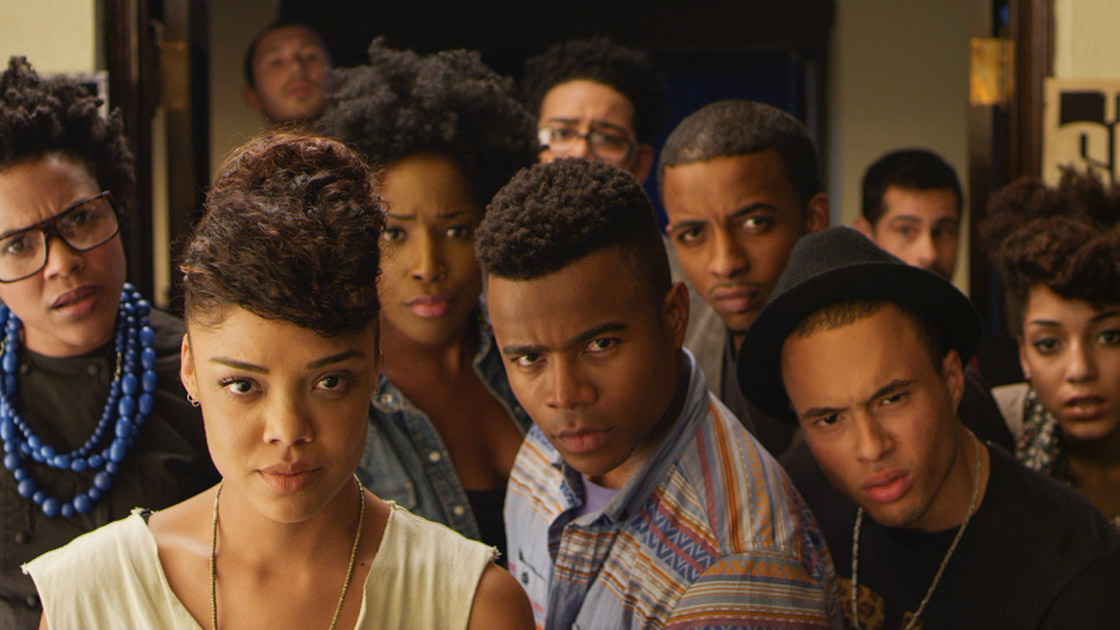When I arrived as an undergraduate at Kent State University, I participated in Kupita, a week-long orientation for students of color in which faculty and seasoned students tried to prepare us for what lay ahead: four years as the rare black and brown faces on campus.
Those lessons stung in spots, massaged in others, and left us exhausted – rather like the new film, “Dear White People.” Set at the fictitious Ivy League school Winchester University, the debut movie of Justin Simien follows four main characters as they figure out what blackness means to them. Not to mention managing all the expectations accompanying that identity.
Viewers meet Troy Fairbanks (Brandon P. Bell), the All-American legacy who squashes his own aspirations to please his father, the dean of students. His sometime love interest is Coco Conners (Teyonah Parris), who wonders why black people have to be so pissed off all the time. The gay black loner is Lionel Higgins (Tyler James Williams) – he wants solidarity but stumbles onto the staff of the all-white student newspaper as a token. And then there’s Sam White (Tessa Thompson), the militant Lisa Bonet lookalike who is burdened with the responsibility of being the loudest voice fighting for black students on campus.
The story begins with Troy and Sam running for “Head of House” in Armstrong-Parker, the historically black residence hall. Sam’s platform is the repeal of the recently passed Randomization of Housing Act, which threatens the safe space black students have long called their own. Troy runs on the fact that well, he’s Troy. Sam wins. The contest sets in motion a prickly battle over racial pride and identity against a backdrop of clueless white students and hyper-vigilant black students.
This tension culminates in a racist “Unleash Your Inner Negro” party thrown by white staffers at the school’s humor magazine. Blackface, crude wigs, and gaudy gold jewelry assault the senses. An older white man sitting beside me let out a low “Wow” in disbelief as the images flashed. (It’s easy to forget this isn’t purely fictional — so Simien tucks into his end credits some actual photos from “blackface parties” at colleges all over the country.)
After the flames cool from the party, the walls begin to come down for our main characters. Everyone inches a little closer to discovering who she or he truly is, even if no one is ready to make any bold declarations just yet.
Simien, 31, wrote and directed the film, which he began working on eight years ago. In 2012, he financed a concept trailer with his income tax refund, launching a crowd-funding campaign that raised more than $41,000 toward production costs. After studio executives promised distribution if “Dear White People” made it to the Sundance Film Festival, the film walked away this year with the U.S. Dramatic Special Jury Award for Breakthrough Talent.
Some of Simien’s visual devices are unnerving — extreme close-ups and scenes shot from below make the characters appear to look down on the viewer. Add the piercing dialogue about race and I squirmed in my seat. Still, Simien deserves props for not being afraid to “go there.” In less than two hours he covers the presumed sexual prowess of black men, the cultural struggles of biracial people, homophobia within the black community and stereotypical Hollywood imagery financed by white people. There’s a lot to unload.
The actors all deliver stellar, if occasionally heavy-handed, performances. Sam, in particular, often sounds like she is reading a dissertation when she speaks. But I believe the academic posturing was intentional, a way to remind viewers that micro-aggressions like “Can I touch your hair” are indeed rooted in years of racial friction.
“Dear White People” is playing nationwide. It is not a perfect film, but well worth seeing. Do the Right Thing – and check out a rising star.


